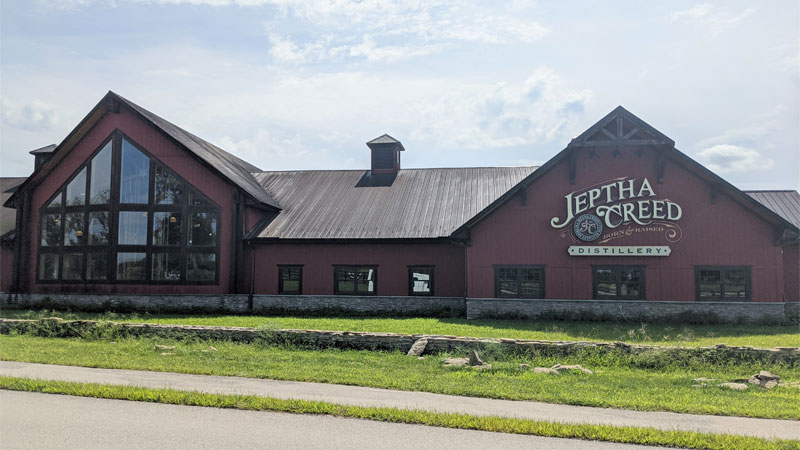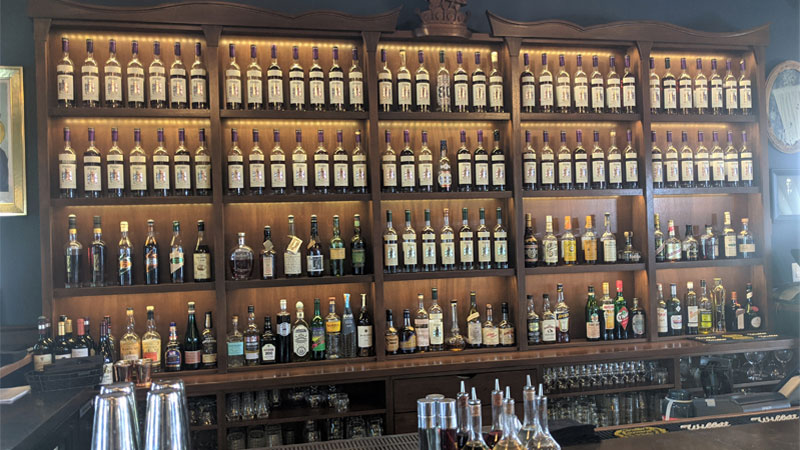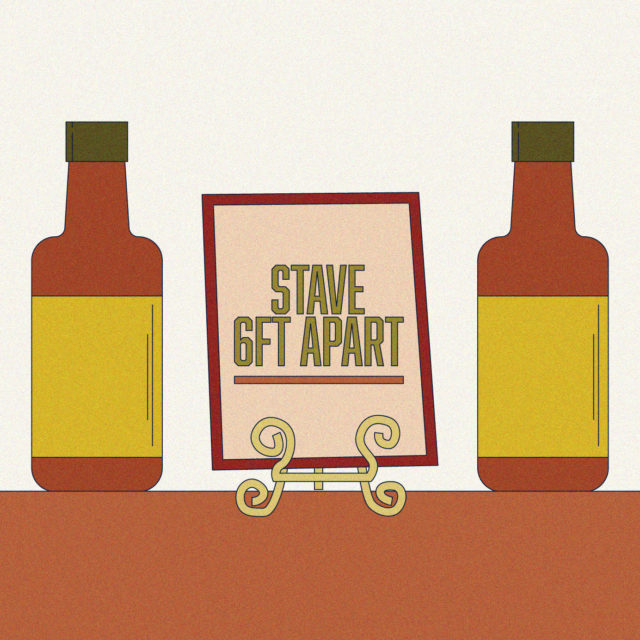Visitors walking into the Four Roses visitor’s center in late August were welcomed by a Kentucky Bourbon Trail sign reading “stave 6 ft apart.” Clever, I think. Immediately upon entering the building, a greeter explains that the retail store is open but they’re not currently offering any tours or tastings. I nod in consent, and begin following the directional arrows on the floor to begin making my way through the shop, getting a first taste of the newly adapted Kentucky bourbon experience.
Across the state, distilleries are taking differing approaches to operating during the pandemic: Some are closed to the public entirely; others have resumed most of their tour experiences, though with reduced capacities and mandatory masking; and others have opened but scaled back to a position somewhere in between those two extremes. Of course, for a brand such as Four Roses, which dates to 1888, the pandemic isn’t endangering its existence. But when a good chunk of a craft distillery’s revenue comes via tours and tastings, on-site dining and retail sales, and hosting large events, the current climate offers a harsher and trickier reality.

The Many Pandemic Pivots of Bourbon Distilleries
At Jeptha Creed Distillery in Shelbyville, noted for the use of bloody butcher corn, several months of public closure was a devastating scenario. “Having to lay off the front house staff was heartbreaking,” says Autumn Nethery, co-owner of the distillery and daughter of master distiller Joyce Nethery. “And it took some brainpower to open back up.”
Distilleries in Kentucky were allowed to reopen under new protocols starting July 1. Jeptha Creed opted to keep its still house and production areas closed to visitors, while a tasting counter was nixed in favor of spaced-out pours offered at the larger main bar. The distillery also boasts an expansive outdoor area, ideal for attracting visitors who wished to remain in the open air.
“We also tried to come up with something that we could do here that people couldn’t do anywhere else, and the barrel tasting was the answer to that,” Nethery says. Visitors can now book and make reservations in advance for a small group tasting in Jeptha Creed’s barrel barn, with rows of plush leather chairs positioned beside barrel racks, that eye-catching dark red corn in the fields within view from the open barn door. “We’ve been overwhelmed with the response from consumers,” Nethry says.
Pandemic or not, people are still clamoring for their bourbon. And when they’re confident that distilleries are open and taking proper safety precautions, they’re coming out in droves. “Reopening was probably the most rewarding experience I’ve gone through in my life,” says Shane Best, who’s worked at Jeptha Creed as a guide for three years. “The first socializing I did [since the pandemic began] was with guests, and they were absolutely overjoyed that we were able to open.”
Most distilleries are reporting that their visitors have been well behaved, eager to participate safely and follow protocols. “Nobody has given us any pushback, and we’ve been booked up,” says Trey Zoeller, founder of Jefferson’s Bourbon, now operating from Kentucky Artisan Distillery. They’ve reduced hours and capacity, and restricted certain areas of the tour. Zoeller was concerned about the health of his tour guides, several of whom are retirees, and wasn’t going to reopen until he felt the correct protocols were in place.
Zoeller says that Jefferson’s was fortunate to be in a position where 90 percent of its sales are off-premise, though it’s not the way he envisioned the year going. “I had big aspirations to move that needle more towards on-premise this year, but we’ve been in a great position,” he says.
At Willett Distillery in Bardstown, visitors are still welcomed, though no tours are being offered. The experience has been replaced with a tasting and Q&A session that’s limited to a small handful of guests at a time. “We have to stick to our safety protocols, and cannot expose our work family and our operations to any unnecessary risk,” explains Britt Chavanne, who manages the distillery’s day-to-day operations. “We are all about commingling our barrels but not our buildings at this time!”
Distanced outdoor seating is available at The Bar at Willett, which for many guests is the main attraction to begin with, serving as the best way to taste through the cult-favorite distillery’s expansive range of single barrels. As of mid-September, the ever-changing collection touted 77 individual barrels to choose from.

At Kentucky Peerless Distilling, a restarted legacy brand located in Louisville, being closed to the public was a setback. “We operate with a heavier dependence on our tours and retail firing away on all cylinders than other [distilleries] would,” says Hunter Cecil, who serves as a guide and handles direct sales for the distillery. Peerless was able to retain all of its staff throughout the shutdown, though, by keeping them busy with on-site maintenance tasks and other to-dos within the distillery. The shift in focus helped push forward a few long-term projects and bought the distillery time until reopening its facility was possible.
“Now it’s great to be able to open again and we’re doing everything we can to be proper and safe,” Cecil says. Tours and tastings now have reduced capacities, and are offered fewer times per day, allowing for sanitization in between sessions.
MB Roland Distillery, meanwhile, was thankful that it had a decade of business under its belt, according to Paul Tomaszewski, co-founder and distiller. Being an upstart that was forced to shutter for an extended period would have been untenable, he says, particularly given the distillery’s locale in the southwestern part of the state. “We got lucky in that way, and everything we’ve done up to this point, 10-plus years now, has enabled us in a pandemic to be in a position where we’re not dying,” Tomaszewski says.
“Not to say that the visitation traffic isn’t good for us,” he adds. Even in Pembroke, a place known more for tobacco than bourbon, the distillery attracts 50,000 visitors in a typical year. Impressively, only a tiny fraction of that number comes from the hardcore bourbon tourists who blaze trails across central Kentucky.
Other distilleries rely on their unique settings as a core component of how they’re able to reach consumers, making a shift to a virtual world all the more challenging. Such is the case with Castle & Key, located in Frankfort, amid the rolling hills and horse farms beyond Lexington.
“We’re doing a lot of virtual, the Zoom calls and everything, but it’s really weird because the biggest component to us and our story is the grounds here, being able to see the size and scope of everything, and learn about its history,” explains Brett Connors, Castle & Key’s blender and brand ambassador. “We do it, but it’s hard to see what it really could be.” That’s what happens when you’ve rebuilt the literal castle that served as the Old Taylor Distillery in the late 1800s, spending years recreating a beautiful and historic 113-acre site. After production ceased in 1972, current owners Will Arvin and Wes Murry purchased the property in 2014, and opened it up to the public in 2018.
The flip side of that is that now that guests are welcomed back, there’s a spacious outdoor setting available. “How do we [open back up] without limiting guest interaction and experience, if you take the time to drive out here to visit us?” Connors asks, adding, “I think we’ve found a lot of creative solutions.”
The distillery’s summer concert series was canceled, along with a planned celebratory bash for the pending release of its first whiskey later this year. However, visitors today can stroll the grounds for free, and can order a drink from a walk-up counter to enjoy an outdoor gin and tonic or two.
There’s no one-size-fits-all solution for successfully surviving and pivoting distillery operation during an ongoing pandemic, because there’s no one-size-fits-all distillery. But if anything is true in bourbon country, it’s that people are still thirsty for a drink, and they’re willing to mask up and “stave” six feet apart for the privilege.
This story is a part of VP Pro, our free platform and newsletter for drinks industry professionals, covering wine, beer, liquor, and beyond. Sign up for VP Pro now!
